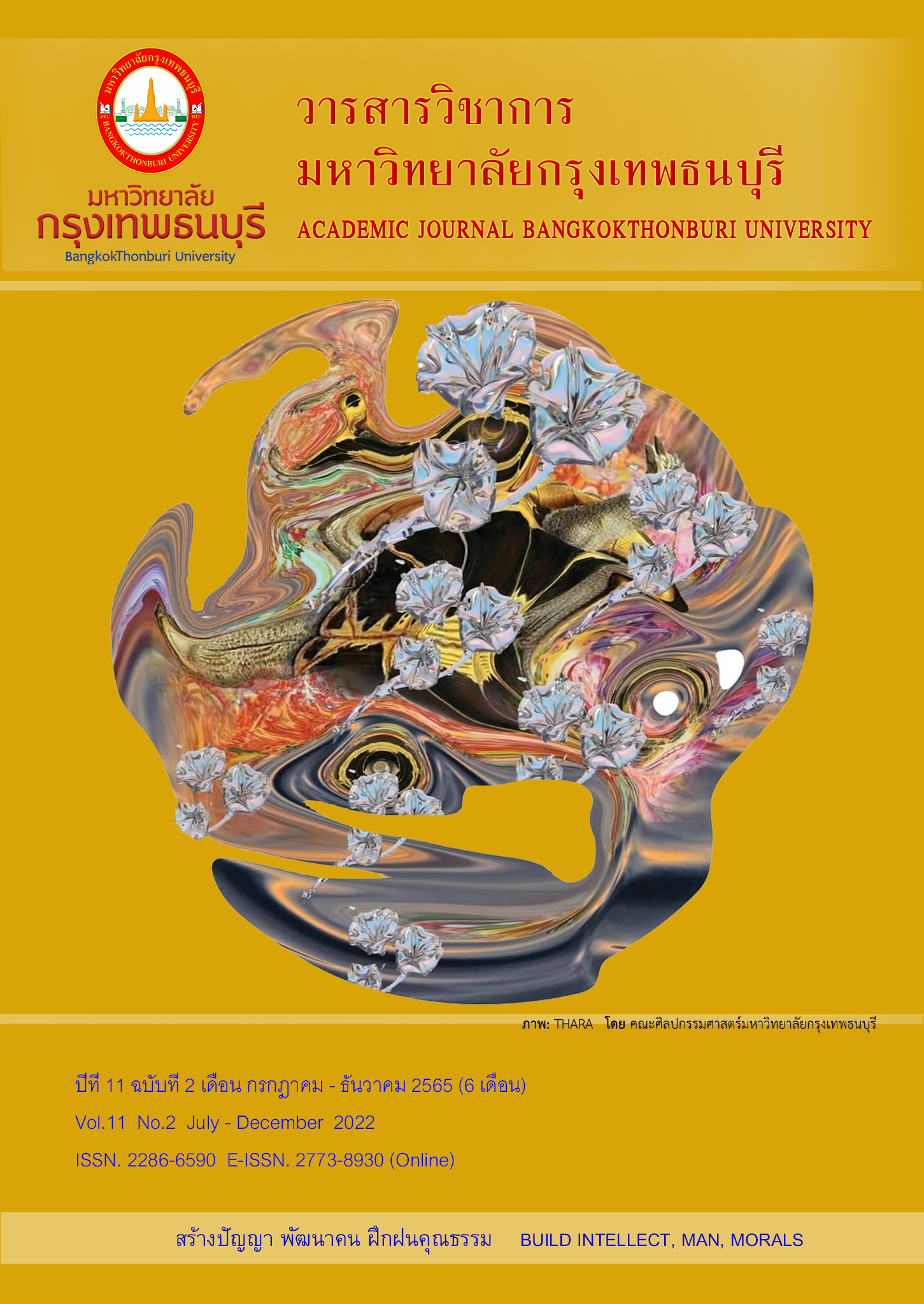Factors of management ability to enter the digital economy
Main Article Content
Abstract
The objectives of this research were: 1. To study internal factors and external factors that affect management ability to step into the digital economy. 2. To study the level of management ability. to step into the digital economy The sample group used in this research The sample size was 400 samples. The sampling used in this study was a purposive sampling. The statistics used to analyze the data consisted of percentage, mean and standard deviation, F -Test, One-Way ANOVA, and Linear Regression Analysis.
The study found that the level of opinions about internal and external factors affecting the ability of management to step into the digital economy found that the overall internal factors had an average of 3. 90. The opinion level was at a high level. Human resource management had an average of 3.84, management factors had an average of 3.96 and overall external factors had an average of 3.85, with competitiveness factors had an average of 3.83 and technology factors had an average 3.85 The results of the analysis of multiple regression coefficients revealed that the internal factors of human resource management and technology external factors affecting the management's ability to step into the digital economy. was statistically significant.
Article Details

This work is licensed under a Creative Commons Attribution-NonCommercial-NoDerivatives 4.0 International License.
References
กรุงเทพธุรกิจ. (2565). เศรษฐกิจดิจิทัล อนาคตประเทศไทย. สืบค้นเมื่อ 10 กรกฎาคม 2565 จาก https://www.bangkokbiznews.com/business/1009559
นันทพร ดำรงพงศ์. (2561). ปัจจัยที่ส่งผลต่อความสามารถในการดำเนินธุรกิจของผู้ประกอบการวิสาหกิจขนาดกลางและขนาดย่อมเพื่อรองรับเศรษฐกิจยุคดิจิทัลในประเทศไทย. วารสารวิทยาการจัดการสมัยใหม่, 11(1). 239-255.
พิชิต เทพวรรณ์. (2554). การจัดการทรัพยากรมนุษย์เชิงกลยุทธ์: แนวคิดและกลยุทธ์เพื่อความได้เปรียบทางการแข่งขัน. กรุงเทพฯ: ซีเอ็ดยูเคชั่น.
พิเชษฐ์ ไทยนิยม (2559). ปัจจัยที่ส่งผลต่อความพร้อมของอุตสาหกรรมไฟฟ้าและอิเล็กทรอนิกส์เข้าสู่ประชาคมเศรษฐกิจอาเซียน (AEC). วารสารมหาวิทยาลัยราชภัฎสวนสุนันทา, 9(2). 184-196.
วันชัย มีชาติ. (2557). การบริหารองค์การ. (พิมพ์ครั้งที่ 7). กรุงเทพฯ: สำนักพิมพ์แห่งจุฬาลงกรณ์มหาวิทยาลัย. หน้า 2-7, 39-40.
วารุณี กุลรัตนาวิจิตรา. (2560). ปัจจัยด้านนวัตกรรมทางธุรกิจส่งผลต่อการดาเนินงานของธุรกิจขนาดกลางและขนาดย่อม (ประเภทบริการ). สาขาการบริหารเทคโนโลยี. วิทยาลัยนวัตกรรม มหาวิทยาลัยธรรมศาสตร์.
วิสาหกิจขนาดกลางและขนาดย่อม(สสว.). (2564). ภาพรวม SME แยกรายจังหวัด หรืออุตสาหกรรม. สืบค้นเมื่อ 10 กรกฎาคม 2565 จาก https://www.sme.go.th/th/ page.php?modulekey=468
สมบูรณ์ คงทองวัฒนาม, ยุวัฒน์ วุฒิเมธี และวันชัย ไพจิตโรจนา. (2558). ต้นแบบประสิทธิภาพการบริหารจัดการของอุตสาหกรรมผลิตชิ้นส่วนไฟฟ้าและอิเล็กทรอนิกส์ (Hard Disk Drive) ในประเทศไทย. วารสารวิทยาศาสตร์และเทคโนโลยี, 23(4). 708-719.
สำนักงานส่งเสริมเศรษฐกิจดิจิทัล. (2563). สถานการณ์เศรษฐกิจดิจิทัลประเทศไทย. สืบค้นเมื่อ
กรกฎาคม 2565 จาก https://www.depa.or.th/th/article-view/thailand-digital-economy-glance
Yamane, T. (1973). Statistics: An Introductory Analysis. (3rd Edition). New York: Harper and Row.


